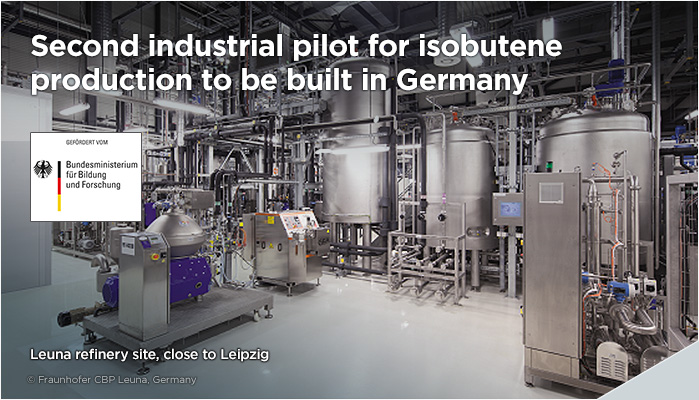Global Bioenergies announces having successfully carried out the first isobutene production trial in its industrial pilot of Pomacle-Bazancourt. Delivered on the Pomacle-Bazancourt site in July, the industrial pilot installation has since been taken through a series of mechanical and functional validations. A production run was initiated on November 3rd, 2014, and resulted in the very first production of fermentative isobutene in an industrial environment.
Global Bioenergies since 2008 has been developing a fermentation process that targets gaseous isobutene. An extensive campaign of trials in laboratory-scale pilots of various sizes had then been conducted. The next frontier consisted in scaling up the process and adapting it to an industrial environment. To address this novel technical challenge Global Bioenergies had obtained a EUR 4 million financing from the French State in 2013 (“Investissements d’Avenir” program).
The first objective was to build a fermenter of a new kind, adapted to the fermentation of gaseous hydrocarbons. Following phases dedicated to engineering and construction, the fermenter was installed in July 2014 at the heart of the Pomacle-Bazancourt industrial complex which brings together leaders in the field of agro-products conversion such as Cristal Union.
After a long phase of mechanical and functional validations, Global Bioenergies’ chemical engineering team decided that the required safety conditions were met to carry out a first trial. It was performed at the very beginning of November over three days. It is the very first time isobutene is produced by fermentation outside of Global Bioenergies’ R&D laboratories located in Evry near Paris.
This trial could rely on the unique expertise of the company ARD (Agro-industrie Recherches et Développements) which is now in charge of the operation of Global Bioenergies’ pilot, as part of an agreement signed recently.
In the coming months, a new campaign of runs will be carried out. The objectives are now the optimization of the process and the production of samples. These samples will then be shipped to various industrialists and in the first instance to Arkema and Audi with whom Global Bioenergies has signed collaboration agreements.
Within the next 18 months, a second industrial pilot with a nameplate capacity of 100 tons per year in Germany will also start-up. The company contemplates the commercialization of full scale plants in the framework of industrial partnerships within 3 to 4 years.
In another recent announcement, Global Bioenergies announced that it has succeeded in the production of bio-butadiene in a lab-scale fermentation device by direct fermentation and without any chemical step. Butadiene is current produced principally through extraction from naphtha cracking. Given the decrease in naphtha cracking capacities, there is a need for alternative routes to butadiene.
Global Bioenergies has been collaborating with rubber chemical producer, Synthos, based in Poland, for this project. The companies claim that this is the first time that the production of butadiene by direct fermentation from renewable resources has been reported. Companies such as Genomatica in collaboration with Braskem are also looking to produce bio-butadiene in a single-step fermentation process.




